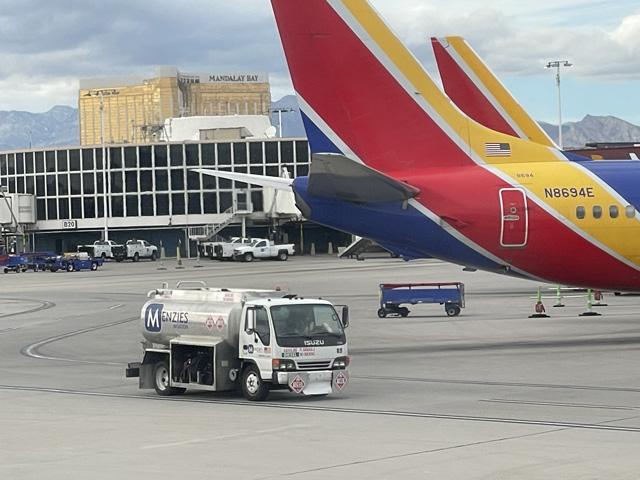Biden Admin Delays SAF Credit Guidance
Biden Administration Delays SAF Tax Credit Guidance as Ethanol Groups Push
LINCOLN, Neb. (DTN) -- The Biden administration will delay a planned announcement of Treasury guidance for a tax credit designed to grow the sustainable aviation fuel industry, as farmers and other ag industry officials anxiously await what could be a boost for ethanol and corn producers.
The delay comes as U.S. Agriculture Secretary Tom Vilsack and EPA Administrator Michael Regan prepare to address hundreds of farmers and others at the Commodity Classic in Houston, Texas.
Reuters reported on Friday that a revision of Argonne National Laboratory's GREET model would be finalized in the coming weeks.
Vilsack said during the Commodity Classic on Friday, that completion of the tax credit will take a couple of more weeks, "not months."
"We're going to take a couple more weeks to get the guidance right," he said.
Vilsack indicated the interagency task force wasn't aware of the extent of "climate-smart practices" that farmers use such as no-till farming.
He said he is confident that 95% of SAF will come from feedstocks from farmers. The modeling needs to factor in the best science, Vilsack said.
"We are measuring twice and cutting once," he said.
P[L1] D[0x0] M[300x250] OOP[F] ADUNIT[] T[]
Ethanol industry groups expressed disappointment at the Biden administration missing a March 1 deadline to release guidance on the 40B tax credit created by the Inflation Reduction Act.
That guidance will determine how ethanol producers will be able to claim the base credit of $1.25 per gallon of SAF produced. The tax credit also sets a bonus credit amount of 1 cent for each percentage point by which the SAF lifecycle greenhouse gas emissions are reduced above 50% compared to petroleum-based jet fuel, up to 50 cents per gallon.
"The administration made a clear commitment to finalize this guidance no later than March 1," Growth Energy CEO Emily Skor said in a statement Friday.
"This delay is frustrating, but we're optimistic that it's happening for a productive reason. Ultimately, what's most important is getting it right and making sure that the resulting updates provide real opportunities for American farmers to contribute to the SAF market. Officials should follow the science behind Argonne-GREET, the most accurate model and the only one that accounts for all of the climate-smart innovations happening on farms across America's heartland."
Skor said American ethanol producers "must be allowed to compete" in the SAF marketplace.
"The alternative is making SAF from Brazilian sugar cane, or used cooking oil imported from China, instead of renewable crop-based feedstocks grown on American farms," she said.
Geoff Cooper, president and CEO of the Renewable Fuels Association, said in a statement the GREET model is "critically important" to determining eligibility for the tax credit. Cooper called on the administration to finish its work as soon as possible.
"While we are pleased to hear progress is being made on the modified GREET model, we are disappointed by this additional delay," he said.
"RFA is calling on the interagency working group to complete this process as expeditiously as possible, while maintaining scientific integrity and honoring the commitment to incorporate a broad range of carbon reduction strategies. To meet the Biden administration's SAF goals, the marketplace needs certainty and clarity. Investment and innovation in SAF technologies will remain frozen until the model is finalized and additional guidance is issued."
Cooper said "getting the modeling right" could open the door for farmers and ethanol producers to participate in an "enormous" decarbonization opportunity.
"But getting it wrong will strand investments and assure the failure of the Biden administration's climate objectives," he said.
Brian Jennings, CEO of the American Coalition for Ethanol, said in a statement it is important to get the modeling right: "We are grateful for the leadership and tenacity of USDA Secretary Vilsack as the interagency working group continues to work through key details of how the GREET model will be modified for the new 40B SAF and 45Z clean fuel production tax credits," he said.
"Since 40B and 45Z are based on lifecycle greenhouse gas emissions, every single point of carbon intensity has value, which makes it essential to get the details around any modifications to the GREET model right. That's why we wrote the interagency working group earlier this week to emphasize the importance of a GREET model for 40B and 45Z which includes meaningful carbon credits for climate-smart agriculture practices. We also cautioned the interagency working group against a final model approach which arbitrarily inflates land-use change penalties that have been disproven by real-world observations of what is actually occurring."
DTN Ag Policy Editor Chris Clayton contributed to this article.
Todd Neeley can be reached at todd.neeley@dtn.com
Follow him on X, formerly known as Twitter, @DTNeeley
(c) Copyright 2024 DTN, LLC. All rights reserved.




